

On October 22, Beijing time 21:00-22:45, the 2020 online meeting of the Global Education Deans’ Forum (GEDF) was held via ZOOM platform. The 3rd GEDF, originally scheduled to be held at Boston College in the United States in late October this year, was postponed due to the impact of the COVID-19 epidemic. The School of Education and Human Development of Boston College initiated an online meeting on October 22 this year. More than 40 education schools deans from China, the United States, Canada, the United Kingdom, Russia, Spain, Argentina, New Zealand, Australia, Singapore, India, South Korea, Hong Kong and other countries and regions gathered online and conducted in-depth exchanges and discussions focused on the current education status of their countries or regions during the epidemic, especially the current teaching and research situations in their education schools and universities, the challenges and measures they are facing and taking respectively, the responsibilities and missions their education schools assumed during the epidemic, as well as issues to be discussed in the next Global Education Deans’ Forum. Yuan Zhenguo, Dean of the Faculty of Education, Xun Yuan, Executive Associate Dean of the Faculty of Education, Yang Fuyi, Associate Dean of the Graduate School, ECNU, and staff from the International Affairs Division of the Faculty of Education attended the meeting.
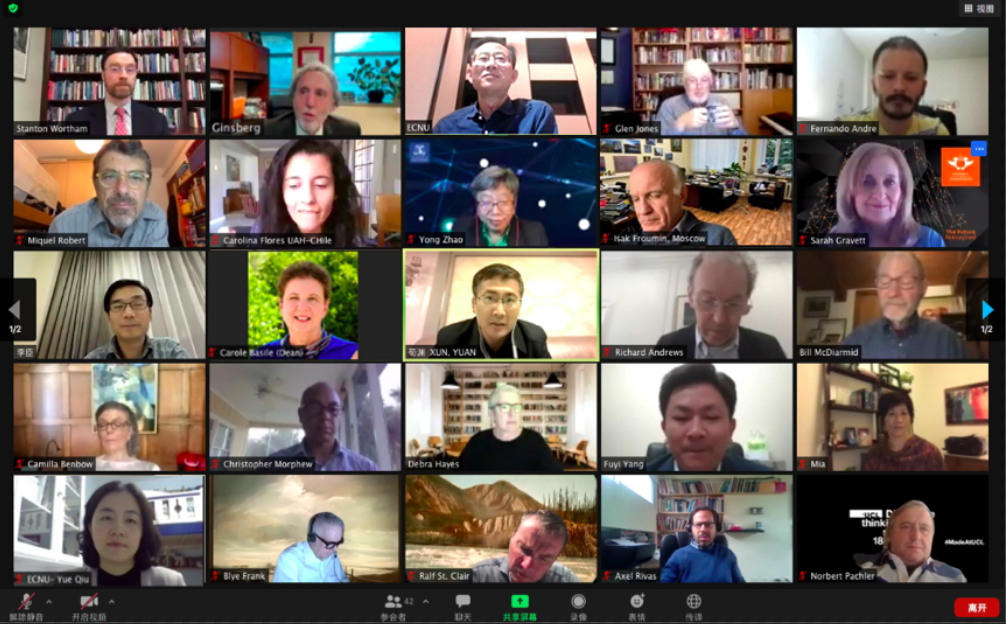
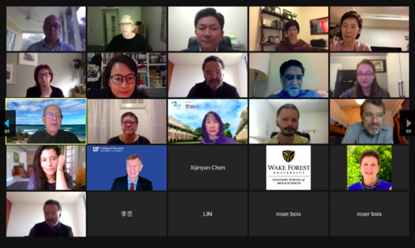
Participants of the 2020 online meeting of GEDF
The online meeting was presided over by Stanton Wortham, Dean of the School of Education and Human Development of Boston College. At the beginning of the meeting, the education schools deans extended their greetings to each other, and they all stated that under the background of the COVID-19 pandemic, education is facing lots of challenges while also giving birth to various new forms, looking forward to experiences sharing, exchanges and cooperation among the global education colleges leaders to promote the solution to education issues across national borders and regions.
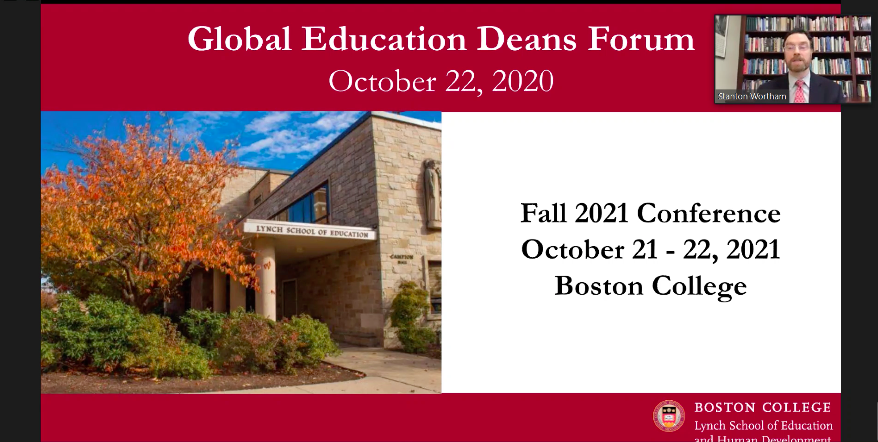
Stanton Wortham, Dean of the School of Education and Human Development of Boston College,presided over the meeting
Subsequently, Yang Fuyi, Associate Dean of the Graduate School of East China Normal University, Rick Ginsberg, Dean of School of Education of the University of Kansas, Debra Hayes, Dean of the School of Education and Social Work, University of Sydney, Norbert Pachler, Associate Dean of the School of Education, University College London, and Dean Axel Rivas, the School of Education, University of San Andres, shared current education situations and their experience in response to the epidemic.
Professor Yang Fuyi introduced the efforts made by East China Normal University and its Faculty of Education during the epidemic from five aspects: online micro-courses, daily teaching, academic progress, voices in media, and social service. He mentioned that the epidemic in China has basically stabilized and offline courses have been resumed in succession. The “two-line integration” teaching is still an important instruction form in the post-epidemic era, and universities need to fully exploit their professional advantages to promote steady progress of global basic education. Based on this, Professor Yang Fuyi shared the ECNU’s experience, especially the “Education during the Anti-epidemic Combat” micro-courses, the online international course of “Science and Philosophy of Educational Research” instructed by Professor Zhao Yong, the Global Chair Professor of ECNU, new teaching methods in elementary and secondary schools under the epidemic explored by scholars of the Faculty of Education. They voiced in media to help China’s basic education and actively carry out transnational support actions to spread experience and resources to the world.
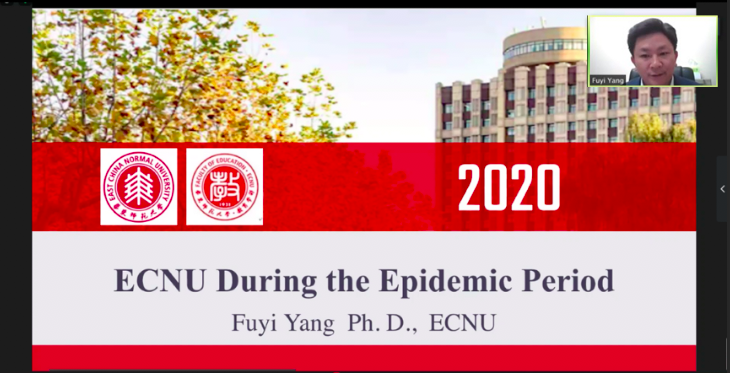
Yang Fuyi, Associate Dean of the Graduate School, ECNU, shared the educational experience of ECNU and Faculty of Education during the epidemic
Dean Ginsberg focused on sharing the challenges and experience of the Education schools in U.S. during the epidemic. U.S. universities generally face health and safety, equity, economics, and enrollment issues that have been impacted by the epidemic; teacher groups need to get the hang of multiple teaching forms such as in-person instruction, online and integrated teaching, and scientific research, personnel training, as well as daily life are hindered; the academic, employment and financial problems of international students and graduates need to be solved urgently; he also pointed out that for some time in the future, they may have to face “epidemic fatigue” and emotion problems of the teachers, employees and students in primary and secondary schools for a long time. Given that the education of the United States and other countries is impacted in all aspects by the epidemic, Dean Ginsberg proposed that the cooperation and exchanges among the Global Education Schools deans will be an opportunity to uphold the principles of mutual learning, valuing diversity, active cooperation, and building relationships, and to respond to challenges in learning, leadership and action.
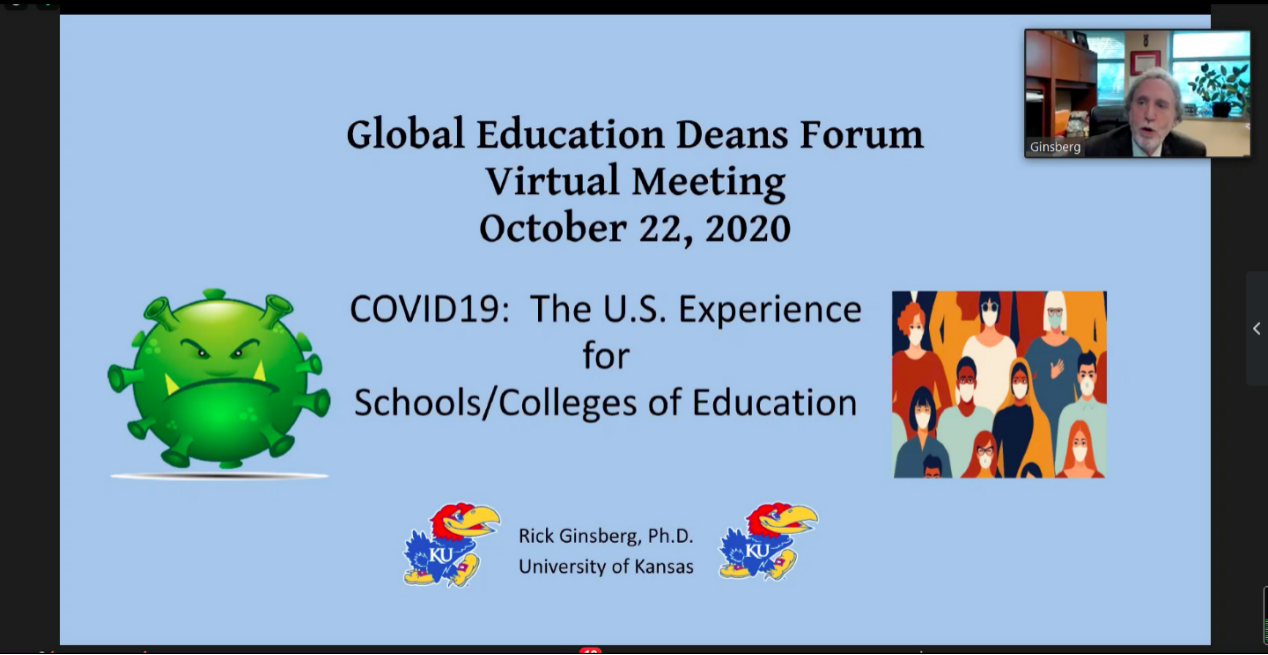
Rick Ginsberg, Dean of School of Education, The University of Kansas, USA shared the challenges and experience of the U.S education schools
Dean Debra Hayes focused on Australia’s education expenses and funding plans. She mentioned that the Job-Ready Graduates Bill passed by the Senate would result in the biggest changes to higher education funding in thirty years. Not only will the amount of tuition paid by students increase, but also the coming academic pressure, professional imbalance, improper incentives, as well as urban and rural issues will gradually become prominent.
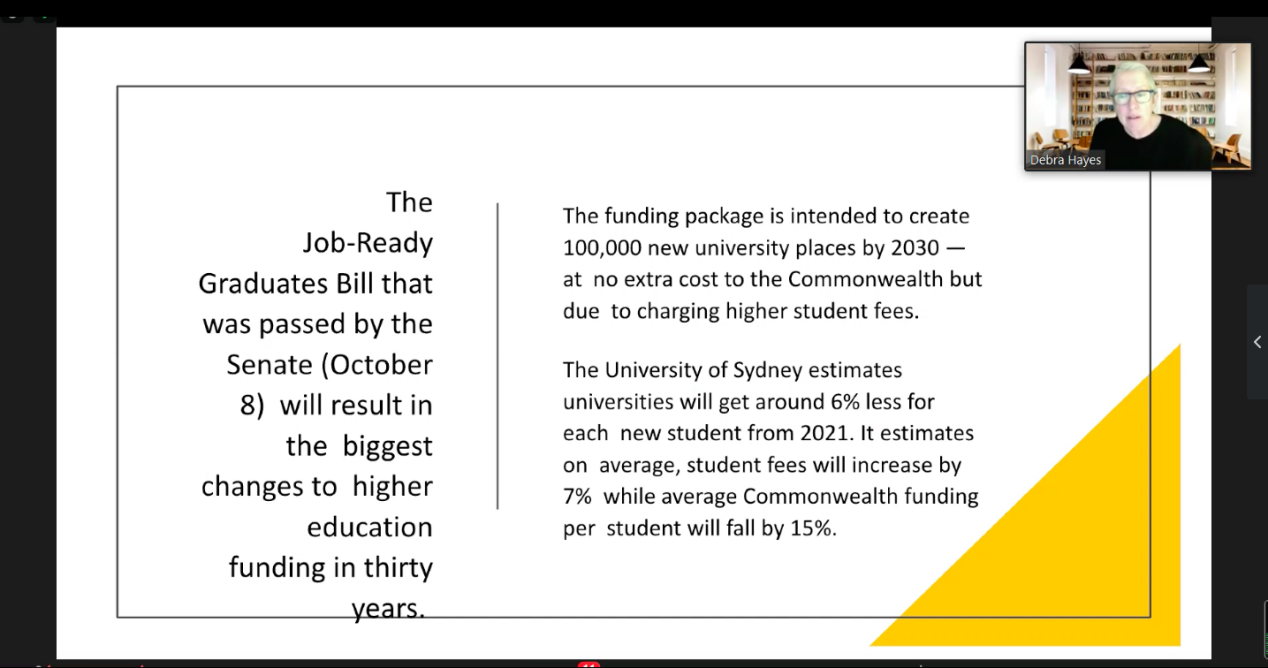
Debra Hayes, Dean of School of Education and Social Work, The University of Sydney, Australia shared Australia’s education expenses and funding plan
Associate Dean Norbert Pachler shared the experience of University College London in terms of the conceptual framing of crisis response, crisis management structure, establishment of thematic cross-cutting working groups with academic, professional service and technical service memberships, investment, school system and policy modification and development. He mentioned that the conceptual framework of crisis response needs to shift from Connected Curriculum to Connected Learning and Connected Learners in order to support the transition from emergence remote teaching to learning design informed planning with a focus on digital asynchronous first, and to ensure that students have positive learning experiences as active participants in their learning rather than passive recipients of information. In addition, Prof. Norbert Pachler also systematically introduced the key model of the crisis management structure, the membership system of the cross-cutting working groups, and the aspects involved in investment and policy modification.

Norbert Pachler, Associate Dean of Institute of Education, University College London shared the experience of University College London
Professor Axel Rivas, Dean of the School of Education of San Andrés University, gave an overview report on Internet education in Latin America. The school used digital platforms to compensate for the interruption of in- person instruction courses, and set special regulations to ensure the validity of graduation degrees. Dean Axel Rivas suggested to keep prudence in relation to the face-to-face modalities return, prioritizing practical activities (hands-on) and designing eventual implementation of hybrid schemes. Their special regulation cases include reopening processes, hybrid scheme design, and Internet investment.
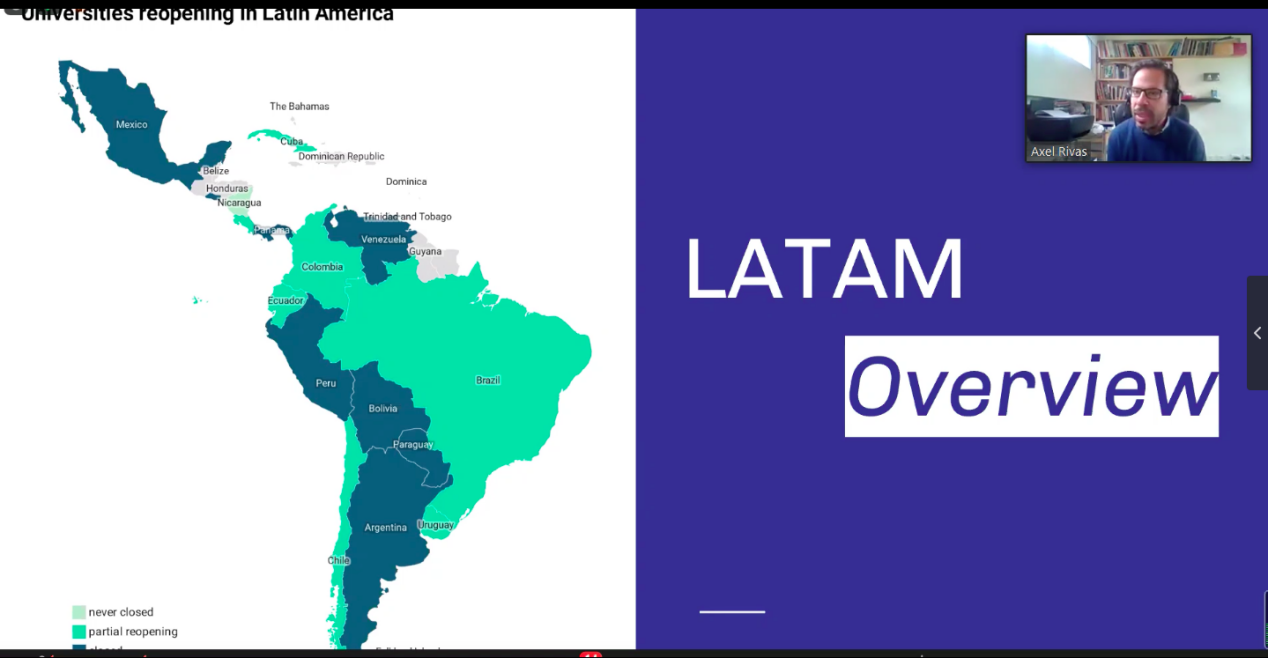
Axel Rivas, Dean of the School of Education of San Andrés University, shared Internet education in Latin America
After the keynote speeches, group discussion was conducted. The deans realized and advanced that, under the epidemic, elementary education and higher education in various countries have been impacted. Students learn online, teachers teach online, and both students and teachers feel “freshness” and “fatigue” online simultaneously. Various course forms are launched, and the auxiliary methods in the past have become the main teaching methods. Many countries and regions have gradually accumulated lots of experience and lessons. The cooperation and exchanges among global education schools will promote global education development. It’s high time that policy makers and pedagogical researchers of education schools worked together to adapt to the new educational patterns.
At the end of the meeting, Prof. Yuan Zhenguo, Dean of the Faculty of Education, ECNU, made a concluding speech. He said that it is a reform to the traditional teaching system and curriculum system. The education schools leaders should collaborate in a variety of ways as widely as possible, “How can we open up a new path to encourage students and professors to communicate across countries amid the epidemic?” It is a question worthy of research. The more difficult it is, the more important university academic exchanges are. Without cooperation and exchanges, there will be no academics and its development. At the same time, the education schools should lead everyone to think about how to maintain the values and correct orientation of education while coping with the global epidemic, and how to promote the common development of mankind.
The Global Education Deans’ Forum was jointly initiated by East China Normal University and the University of Kansas to create a permanent mechanism for cooperation and dialogue for the world’s leading education schools leaders. The first two forums, hosted by East China Normal University, undertook by the Faculty of Education, ECNU, all have received positive responses. The convening of the Global Education Deans’ Forum (GEDF) conforms to the development and changes of the times, and substantively promotes education schools (faculties) to cross national boundaries and regions, establish in-depth cooperation, and respond to various challenges of the educational environment globalization.